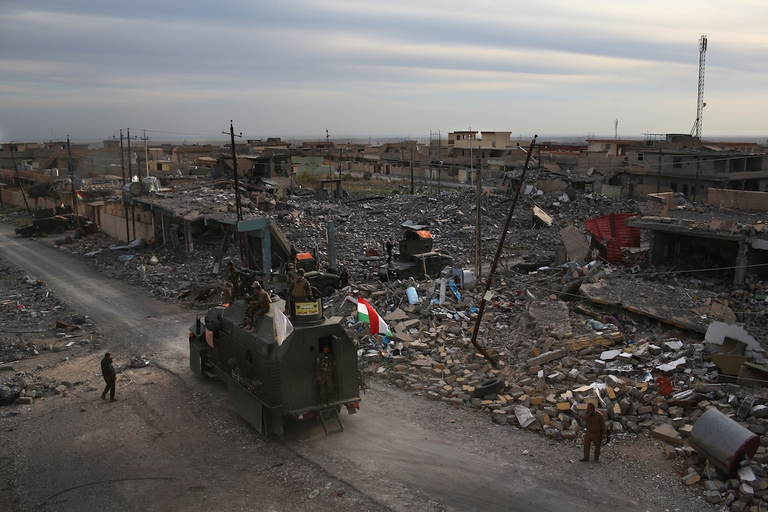
A federal court in Washington, D.C. has struck down the Dakota Access Pipeline, following years of campaigning by the Standing Rock Sioux tribe.
I combattenti dell’Isis controllano numerosi giacimenti. Secondo alcune inchieste, parte del greggio passerebbe per la Turchia e raggiungerebbe l’Europa.
To carry out war – like the one triggered by Isis over Syria and Iraq and then “exported” to Western countries in the form of terrorism – money is needed. A lot of money. For this reason, the Islamic State’s army has identified a set of measures to finance itself.
An article published by The Financial Times in October denounced that “the trade in oil has been declared a prime target by the international military coalition fighting the group. And yet it goes on, undisturbed”. Thanks to revenues deriving from it, fundamentalists can buy arms and resources needed to fuel their war machine.
“Dozens of interviews with Syrian traders and oil engineers as well as western intelligence officials and oil experts reveal a sprawling operation almost akin to a state oil company,” the newspaper reports. From the oilfields of al-Omar and al-Jabsah in Syria to Ajil and Allas fields in Iraq, there are numerous oilfields managed by Isis. Fundamentalists also recruited skilled workers, from engineers to managers, in order to maximise profits. Indeed, they reached an estimated production of 34-40 thousand barrels per day. Considering that oil is sold for 20 to 45 dollars per barrel, we can easily assume daily revenues worth 1.5 million dollars. As for cash money, according to a study published by UK Treasury, fundamentalists can count on a network of complaisant local banks.
Some Iraqi oilfields have been seized by Baghdad’s government army in April. Isis, over 10 months only, has gained 450 million dollars. This is the great difference between al-Qaeda and the Islamic State: the former is an organisation living on donations from wealthy foreign sponsors, whilst the latter tries to establish itself as an independent system. The question that now arises is: who do fundamentalists sell oil to? In the area they control, the entire society depends on DAESH’s oil. Hospitals, shops, agricultural machinery, and electricity generators do need diesel, and estimates show that fundamentalists control an area populated by some 10 million people.
Abroad, there are many realities buying oil from Isis, sometimes unwittingly, sometimes not. According to the UK newspaper, even Syrian rebels, who fight against the Islamic State, are forced to buy diesel for their provisions. There’s more: an investigative report carried out by the monthly newspaper Alternatives Economiques shows how Isis would be able to sell oil in the international market, thanks to smuggling networks spreading crude oil towards Turkey.
A situation that has been confirmed by experts, interviewed by the New York Times in 2014, which talked about truckloads that pass through Turkey thanks to bribes, headed to Europe. Just a year ago, the EU ambassador in Iraq, Jana Hybaskova, clearly declared that some member states buy oil from Isis. On 16 November, Russia’s President Vladimir Putin said he personally saw satellite images of truck convoys of tens of kilometres. Headed to global markets.
Siamo anche su WhatsApp. Segui il canale ufficiale LifeGate per restare aggiornata, aggiornato sulle ultime notizie e sulle nostre attività.
![]()
Quest'opera è distribuita con Licenza Creative Commons Attribuzione - Non commerciale - Non opere derivate 4.0 Internazionale.
A federal court in Washington, D.C. has struck down the Dakota Access Pipeline, following years of campaigning by the Standing Rock Sioux tribe.
Thirty years ago, Bill McKibben alerted us to the threat of climate change. In 1989 he published his groundbreaking book, The End of Nature, which was considered the first book on climate change for the general audience. Today, he broadens his warning. Humans have now emerged as a “destructive geological force”, he writes in his
L’8 giugno si tengono le elezioni in Regno Unito per scegliere chi guiderà il paese nei negoziati per la Brexit. Theresa May è favorita, ma il suo vantaggio è in calo.
The Canadian oil company Pacific E&P, who had been granted the right to explore and extract oil in the Peruvian Amazon by the national government, has halted its exploration activities in block 135 of the rainforest (which is divided into “blocks” of oil and gas exploration). The company released a statement saying it “has made the decision to relinquish its exploration
The Bakken or Dakota Access Pipeline (DAPL), an underground oil pipeline project in the United States, is owned by a network of oil and pipeline companies, joint ventures and holding companies. After Trump revived it in January without the consent of the Sioux indigenous tribe affected by it and flouting environmental laws, many investors both from the US
Abortion, torture, pipelines, trade agreements, LGBT rights and the US-Mexico border wall. What happened during Trump’s first week leading the United States.
Canadian Prime Minister Justin Trudeau has approved the building of a major oil pipeline known as the Kinder Morgan pipeline, which will run from the Alberta Tar Sands to the port of Burnaby on the province of British Columbia’s (BC) Pacific coast, whilst rejecting the construction of its twin, the Northern Gateway pipeline. The Kinder
Riconosciuti i rischi ambientali del progetto Dakota access pipeline. Una vittoria per i sioux e tutti gli nativi americani. Ma la lotta potrebbe non essere finita.
It has been four years since the Inter-American Court of Human Rights found Ecuador guilty of granting the ancestral land of the Sarayaku in concession to an oil and gas company. The community of about 1,200 indigenous Kichwa people is situated along the Bobonaza River, in the southern part of the Ecuadorian Amazon. In 2012, the Court reaffirmed the right of








